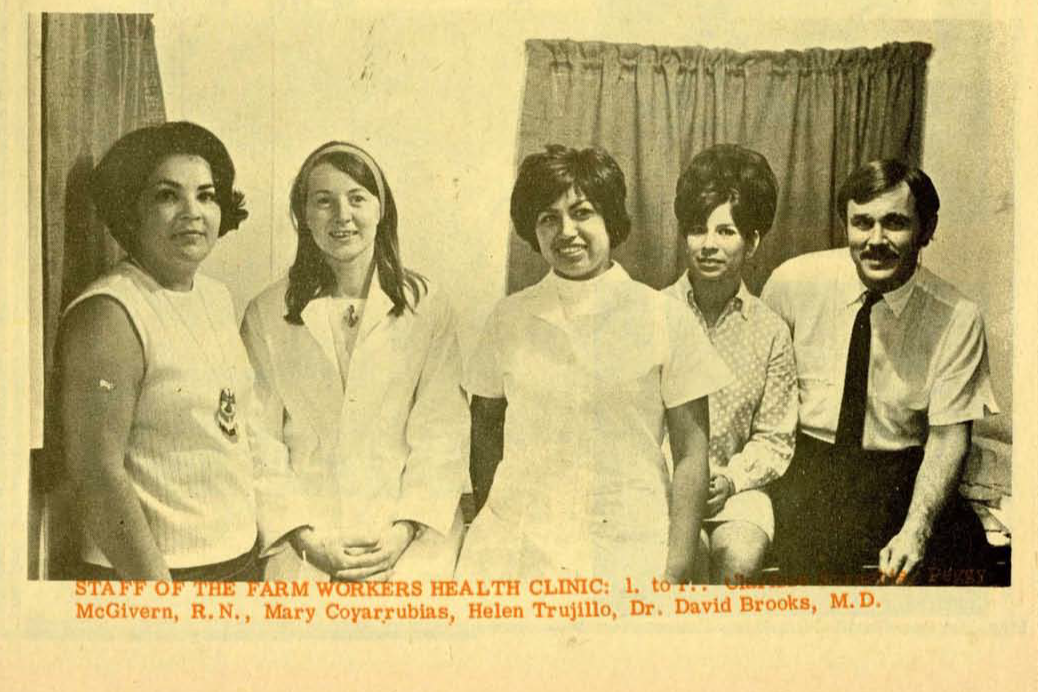Health Clinic
Health Clinic
Doctor examining a patient, Delano, ca. 1966. Photo by Emmon Clarke.
César Chávez was deeply concerned about the plight of farmworkers and believed that they should have their own medical service to address their specific needs and the historic lack of access. To Chávez, the clinic was key in building a strong organization and a broader movement to help the poor; the clinic was inseparable from the Union. The first clinic opened on September 8, 1965, and it was shabby, surviving at first on donations alone. It was staffed by one nurse, Peggy McGivern, and it was set up in the kitchen of a rented house behind the Union’s Delano office. It included a sheet as a curtain for privacy. Donated medicines were kept in a cardboard box inside El Malcriado’s office. Targeted by local authorities, the clinic moved shortly thereafter to 1554 Borel St. in Delano, sharing a four-bedroom house with the DiGiorgio boycott headquarters and the UFW’s theater.
Men waiting at the health clinic, Delano, ca. 1966. Photo by Emmon Clarke.
The clinic’s needs were so severe that for months they had no bank account because every cent was used. Over time, as amenities and equipment improved, they moved to a 50ft x10ft trailer at Arroyo Camp, which at the time functioned as a striking kitchen and grocery store for farmworkers. The trailer was also in poor condition, but the people came, and soon they ran out of space, forcing them to rent a second trailer. The dream was to build a 3,000ft² brick-and-mortar clinic at Forty Acres. Chávez suggested naming it after fallen activist Roger Terronez, who died of medical negligence at a county clinic in Bakersfield and whose death left a deep impression on him. Finally, on October 21, 1971, the Roger Terronez Memorial Clinic (Clínica Médica Campesina) opened, with a small paid administrative staff recruited from the ranks of the farmworkers, and four doctors, three registered nurses, and one nurse practitioner, all volunteers.

Staff of the Health Clinic, photo by El Malcriado, June 7, 1967 issue
A photo of the staff of the Farm Workers Health Clinic, published in the June 7, 1967 issue of El Malcriado. Pictured are Clarisse Parashis, Peggy McGivern, Mary Covarrubias, Helen Trujillo, and David Brooks.
Peggy McGivern and a doctor examining a young patient, Delano, ca. 1966. Photo by Emmon Clarke.
The Clinic charged a small fee and emphasized preventive and ambulatory care, and health education, providing farmworkers access to an x-ray machine, defibrillator, laboratory equipment, a pharmacy, 24-hour emergency care, and full labor and delivery services. Unfortunately, the victory was short-lived. The strain on Union resources, the expiration or loss of union contracts with growers, and tension between medical and Union staff forced the clinics to close, first the Sanger clinic near Fresno in 1976, and then in 1978, the remaining clinics.
Tom & Ethel Bradley Center
California State University, Northridge
18111 Nordhoff Street, Northridge, CA 91330
Phone: (818) 677-1200 / Contact Us

